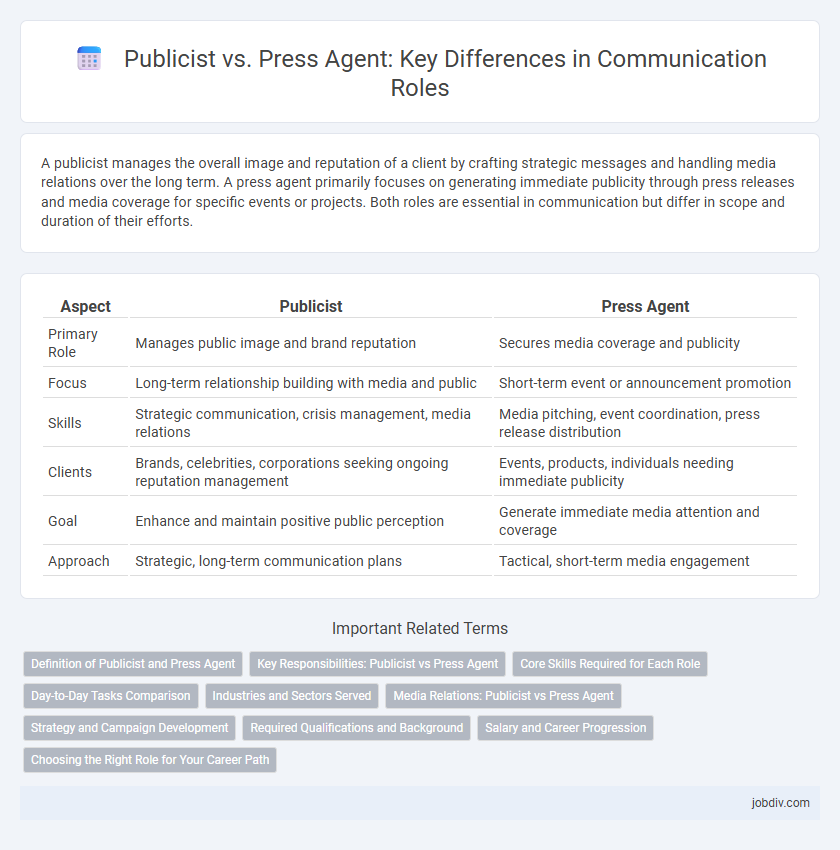A publicist manages the overall image and reputation of a client by crafting strategic messages and handling media relations over the long term. A press agent primarily focuses on generating immediate publicity through press releases and media coverage for specific events or projects. Both roles are essential in communication but differ in scope and duration of their efforts.
Table of Comparison
| Aspect | Publicist | Press Agent |
|---|---|---|
| Primary Role | Manages public image and brand reputation | Secures media coverage and publicity |
| Focus | Long-term relationship building with media and public | Short-term event or announcement promotion |
| Skills | Strategic communication, crisis management, media relations | Media pitching, event coordination, press release distribution |
| Clients | Brands, celebrities, corporations seeking ongoing reputation management | Events, products, individuals needing immediate publicity |
| Goal | Enhance and maintain positive public perception | Generate immediate media attention and coverage |
| Approach | Strategic, long-term communication plans | Tactical, short-term media engagement |
Definition of Publicist and Press Agent
A publicist manages an individual's or organization's public image by coordinating media coverage and crafting positive narratives to enhance reputation. A press agent primarily focuses on generating publicity through media placements and event promotions to attract public attention. Both roles aim to influence public perception but differ in strategy and scope of engagement.
Key Responsibilities: Publicist vs Press Agent
Publicists manage the overall image and media presence of individuals or organizations by crafting strategic narratives and securing positive coverage across multiple platforms. Press agents focus on promoting specific events, projects, or performances through direct media outreach, press releases, and coordinating interviews to generate immediate publicity. Both roles require strong media relationships and effective communication skills to influence public perception and maximize exposure.
Core Skills Required for Each Role
Publicists excel in strategic storytelling, media relations, and content creation to shape a client's public image effectively. Press agents specialize in rapid response, event coordination, and crisis communication to manage real-time media interactions. Both roles demand strong interpersonal skills, adaptability, and an in-depth understanding of media dynamics to influence public perception.
Day-to-Day Tasks Comparison
Publicists manage media relations by crafting press releases, organizing events, and maintaining a positive image for clients through ongoing communication with journalists and influencers. Press agents focus on securing publicity by arranging interviews, coordinating press conferences, and acting as intermediaries between clients and the media. Both roles require strategic messaging but differ in daily emphasis on relationship-building versus proactive media placement.
Industries and Sectors Served
Publicists typically serve industries such as entertainment, fashion, and publishing, focusing on building a positive public image through media relations and publicity campaigns. Press agents commonly work within theater, film, and government sectors, managing press releases, coordinating interviews, and handling press coverage for events and announcements. Both roles cater to varied sectors but differ in their strategic approach and target audiences within the communication industry.
Media Relations: Publicist vs Press Agent
Publicists specialize in managing media relations by crafting positive narratives and securing favorable coverage for clients in various media outlets. Press agents focus on promoting events or individuals through strategic publicity campaigns, emphasizing immediate media attention and press engagement. Both roles require strong connections with journalists but differ in approach, with publicists maintaining ongoing media rapport and press agents driving short-term publicity goals.
Strategy and Campaign Development
Publicists focus on building and maintaining a positive image for clients through strategic messaging and media relations, emphasizing long-term reputation management. Press agents specialize in executing targeted campaigns to generate immediate publicity and media coverage, often using press releases and event coordination. Effective campaign development requires publicists to create comprehensive strategies aligning with client goals, while press agents implement tactical actions to maximize short-term visibility.
Required Qualifications and Background
Publicists typically require strong skills in media relations, content creation, and reputation management, often holding a background in communications, journalism, or public relations. Press agents usually need expertise in publicity stunts, event planning, and crisis communication, frequently coming from theater, entertainment, or public relations education. Both roles demand excellent interpersonal skills, a deep understanding of media landscapes, and the ability to craft compelling narratives under pressure.
Salary and Career Progression
Publicists typically earn an average salary ranging from $40,000 to $70,000 annually, with opportunities for growth into senior communication roles or management positions. Press agents often start with similar salaries but may experience faster wage increases due to their direct involvement in media relations and event coordination. Career progression for both roles involves expanding networks and expertise, with top professionals earning six-figure salaries in large media markets or corporate settings.
Choosing the Right Role for Your Career Path
Choosing between a publicist and a press agent depends on your career goals and strengths in communication strategies. Publicists manage long-term image building and brand reputation through consistent media relations, while press agents focus on generating immediate publicity through press releases and event promotion. Understanding the differences in scope, media engagement, and client interaction is crucial to aligning your skills with the most suitable role in the communications industry.
Publicist vs Press Agent Infographic

 jobdiv.com
jobdiv.com